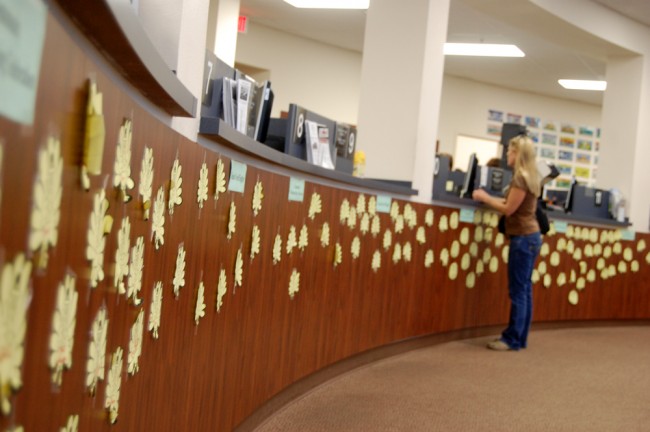
You’re welcome to send your Live Wire news tips or suggestions to [email protected].
Today’s Live Wire: Quick Links
- Feed Flagler Update IX
- Crist Will Pardon Jim Morrison
- Oklahoma and Sharia Law
- Earmarks: Who Cares?
- Homemade Bread Day
- 80% At Risk of “Water Insecurity”
- Lenny Bruce, Fact and Fiction
- Children’s Lit and the Holocaust
- Markowitz Special: Thelonius Monk
- A Few Good Links
![]()
Live Wire Rewinds
![]()

Who can compete with Suzanne Johnston, the tax collector? As of Monday, she’d raised $2,650.48 for Feed Flagler, the countywide effort to raise money and food for the county’s needy. She has a perfect set up: at each teller station at the Tax Collector’s counters, there’s a jar with a turkey on it. People drop their cash donations there. Even nickles and dimes. It adds up. (Tomorrow, we’ll feature another huge effort by one of the Team Flagler challenge members, Chicks With Cans.)
And it adds to the larger effort county-wide, which, as of Monday. had collected $8,803.65.
The drive is designed to raise thousands of dollars for Flagler County’s food pantries and to pay for the Nov. 24 Thanksgiving meal for some 2,000 people in the second annual Feed Flagler celebration. The effort is also designed to stock families’ and food pantries’ shelves well beyond Thanksgiving, which is what makes this necessary and particularly worthy. There’s also a challenge on: several companies and government agencies are competing to out-raise each other, in money and food donations.
Please do your part. We’re doing ours. We started our own fund-raising through FlaglerLive, seeding it with an initial contribution of $100 and further contributions from the following, bringing us to $475:
- Hollingsworth Gallery’s JJ Graham
- David Millonig in Pensacola
- Nancy Nally in Palm Coast
- Darrell Smith in Flagler Beach
- Palm Coast Bible Church
- Inna Hardison
- Anthony Mike Kales
- Kendall Clark
- Jim Guines
- Lynn Snyder
- Anonymous
If you’d like to donate but would prefer to remain anonymous, just send us a note here and we’ll leave your name out of it. Thank you all. Keep it coming.
In Flagler Beach: Please drop off your non-perishable food items at the BeachHouse Beanery–the official coffee house of FlaglerLive–by Nov. 17. The items most needed include rice, pasta, tomato sauce, canned tuna, canned corn,canned beans, peanut butter, jelly, soups and canned fruit.
Here, so far, is the list of monetary donors through the county’s efforts:
- Bug Guard Services, Inc. ($1,000)
- Acme Trophies
- Biblical Truth Ministries ($505)
- Phyllis Carmel
- First Coast Community Credit Union
- Grace Tabernacle Ministries
- Prosperity Bank
- Temple Beth Shalom
- University Women of Flagler, Inc.
- Jean MacAllister
- New Beginnings Church, Inc.
- Cornelius & Ruth Van De Weert
- P. Hassid
- Flagler County’s three Rotary groups
- Tax Collector Suzanne Johnston
- John’s Auto Parts of Bunnell ($1,000)
- Adella Latus
- Michael and Patricia Danforth
- Rev. Elizabeth & Charles Gardner
- Helio Creative
- Hijackers Restaurant
- ITT TDS
- Johnson Orthodontics
- Microhose
- Palm Coast Lions Charities
- Pepsi Co.
- Philippine American Association
- Rocky’s Pizza (Flagler Beach)
- Rotary Club of Flagler County Foundation ($500)
- Rotary Meeting (Single-Meeting Donation, $425)
- Cornelius & Ruth Van De Weert
- N.D. Walsh
- Waste Pro ($500)
- Winn Dixie
- FlaglerLive
Here are the members of Team Flagler’s Food Drive Challenge, coordinated by the county’s Joe Mayer and Christie Mayer (313-4094):
- Flagler County Board of County Commissioners
- Flagler County Tax Collector
- Flagler County Property Appraiser
- Flagler County Schools
- Flagler County Health Department
- Flagler County Clerk of Court
- Flagler County Sheriff’s Department
- Flagler County Supervisor of Elections
- City of Bunnell
- City of Flagler Beach
- City of Palm Coast
- Chicks With Cans
- Waste Pro
- Hammock Dunes Club
- Pop-a-Lock
See Also:
- Feed Flagler on Facebook
- Time to Get Involved: Feed Flagler Challenges County’s Thanksgiving Compassion and Beyond
- Calvary Christian’s Bus Ministry: Treasuring the Homeless, One Sunday at a Time
- Daviana’s Excellent Adventure: Halloween Bash Fills Carts and Kitty for the Hungry
Crist Will Pardon Jim Morrison
 From the St. Pete Times: “Gov. Charlie Crist says he has made up his mind and will pursue a posthumous pardon of rock icon Jim Morrison of the Doors, who was convicted of exposing himself during a Miami concert in 1969. Crist said he began looking into the case a couple of years ago after he was asked about it by a reporter. […] Whether Morrison ever actually exposed himself during the concert, however, has been a matter of intense speculation and debate over the years. Crist said he wasn’t convinced after reviewing the case that Morrison did “what he was charged with here.” Although there are many photographs of the concert, none showed Morrison exposing himself. And there was no video or other tangible evidence, Crist said. “We really don’t know if the alleged act occurred,” Crist said. […] The current Clemency Board has one meeting left, Dec. 9 in Tallahassee. It takes just one member vote to put Morrison’s case on the agenda, and then the votes of two members plus the governor to approve a pardon. After Crist announced last week that he was mulling the idea of a pardon, the other Clemency Board members weighed in with similar sentiments.”
From the St. Pete Times: “Gov. Charlie Crist says he has made up his mind and will pursue a posthumous pardon of rock icon Jim Morrison of the Doors, who was convicted of exposing himself during a Miami concert in 1969. Crist said he began looking into the case a couple of years ago after he was asked about it by a reporter. […] Whether Morrison ever actually exposed himself during the concert, however, has been a matter of intense speculation and debate over the years. Crist said he wasn’t convinced after reviewing the case that Morrison did “what he was charged with here.” Although there are many photographs of the concert, none showed Morrison exposing himself. And there was no video or other tangible evidence, Crist said. “We really don’t know if the alleged act occurred,” Crist said. […] The current Clemency Board has one meeting left, Dec. 9 in Tallahassee. It takes just one member vote to put Morrison’s case on the agenda, and then the votes of two members plus the governor to approve a pardon. After Crist announced last week that he was mulling the idea of a pardon, the other Clemency Board members weighed in with similar sentiments.”
See Also:
Oklahoma’s Problem With Sharia Law, and Why It’s Problematic
 Marci Hamilton sums up the issue at Findlaw: “On Election Day, Oklahoma voters approved a referendum that serves as an interesting microcosm of some of the most difficult challenges facing the United States now. The referendum amended the state constitution (via State Question Number 755) to forbid Oklahoma’s courts from applying international law or Sharia law (also known as Islamic law) in any case before them. The international-law prohibition is a fascinating attempt by Oklahomans to stave off the increasing and unavoidable globalization of our lives. In turn, the prohibition on Sharia law seems to be Oklahomans’ reaction to the demonic Taliban and al-Qaeda forces that are pledged to end our way of life and America itself. Most Americans understand Sharia law to be the motivating doctrine behind the violently radical Islamicists, and one can hardly fault the Oklahomans for seeking to build a legal barrier around their state to keep terrorism out. While the prohibition on the use of international law also presents interesting issues, I will focus here on the Sharia law prohibition. It is problematic.
Marci Hamilton sums up the issue at Findlaw: “On Election Day, Oklahoma voters approved a referendum that serves as an interesting microcosm of some of the most difficult challenges facing the United States now. The referendum amended the state constitution (via State Question Number 755) to forbid Oklahoma’s courts from applying international law or Sharia law (also known as Islamic law) in any case before them. The international-law prohibition is a fascinating attempt by Oklahomans to stave off the increasing and unavoidable globalization of our lives. In turn, the prohibition on Sharia law seems to be Oklahomans’ reaction to the demonic Taliban and al-Qaeda forces that are pledged to end our way of life and America itself. Most Americans understand Sharia law to be the motivating doctrine behind the violently radical Islamicists, and one can hardly fault the Oklahomans for seeking to build a legal barrier around their state to keep terrorism out. While the prohibition on the use of international law also presents interesting issues, I will focus here on the Sharia law prohibition. It is problematic.
The problem for the Oklahomans who thought they could forestall extremists and terrorists from taking over their culture via their referendum, is that there are many interpretations of what Sharia law mandates. […] The Oklahoma amendment, therefore, suffers from a serious case of vagueness. Which interpretation of Sharia law was intended to be targeted? What happens when a defendant argues that the plaintiff’s theories must be rejected because they are derived from a world view or theory or belief that can be identified in the Quran? […] Here is where 755 gets it right: Courts are supposed to apply only civil, secular law to individuals before them. Sometimes those laws reflect Christian or other religious principles, but that does not make them Christian laws. For instance, the law against murder is a secular law, even though the Ten Commandments reflect a similar prohibition. From this perspective, the prohibition on courts applying Sharia law is really not that problematic. […] Muslims have tried to substitute Sharia law in Canada (and elsewhere) for the secular law. That is a non-starter in the United States, where the separation of church and state would forbid such a move. There must be a public policy principle to support a law, not just a bare preference for a religious doctrine. Thus, the Oklahoma legislators were wrong to think that they could constitutionally secure Judeo-Christian “law” in the first place.” The full, fascinating analysis.
See Also:
- Oklahoma “Sharia Law Amendment”, State Question 755 (the Ballot Language)
- Oklahoma bans Sharia law
- Krauthammer’s Sacrilege: When Reactionaries Fire Up their Sunday Missals–and Miss
- “Burn the Koran Day” in Gainesville: When Crude Isn’t the Only Thing Mucking Up Florida
Earmarks are not a big deal, say political scientists. Most are perfectly justifiable, and they definitely aren’t to blame for the ‘eruption of spending’ from Washington. From Miller-McCune: “For one, earmarks (i.e. specific targeted requests for funding separate from the normal appropriations process) account for roughly 2 percent of all appropriations expenditures. (By contrast, the military budget accounts for more than half of all federal discretionary spending). And while some projects might sound silly when taken out of context, most actually serve legitimate local needs that otherwise fall through the cracks of normal funding mechanisms (which, by the way, would disburse the same amount of money even without earmarks). […] After all, the House and the Senate are not about to vote separately on 9,000 stand-alone bills, each covering an intensely local project. Such a process would take forever. […] But, then again, it was under the period of a Republican majority Congress that the practice of earmarking really boomed. In 1994, the last year Democrats were in power, the watchdog group Citizens against Government Waste found 1,318 earmarks worth $7.8 billion. By 2006, the last year of Republican rule, that had ballooned to 9,963 earmarks worth $29 billion.” The full story.
See Also:
- 10 Strategies to Cut the Fat Out of Federal Procurement
- Where’s the Democrats’ fighting spirit?
- White House Surrenders on Bush Tax Cuts
 Yes, ladies and gentlemen, today is Homemade Bread Day. This is not a joke. It’s not a test. It’s not an obscure pun or a Proustian metaphor (he was into muffins, anyway). The day was allegedly declared by the Homemade Bread Day Committee (according to Chase’s Calendar of Events), though that does sound a bit suspicious. From Holiday Insights: “Bakers of the world, rise up and bake some bread, for today is Homemade Bread Day. Bread has been made for thousands of years. Estimates date it’s origin back to 5000-10,000 B.C. Modern day lifestyles has relegated homemade bread to the world of specialty baking and holiday baking. People just don’t have time to bake home made bread. We turn to a quick “run” to bakeries and grocery stores, for our bread needs. The arrival of automatic breadmakers has created a small resurgence of home made breads, especially specialty breads. The purpose of this day is easy to understand.— to make home made bread, and to encourage you and me to make tasty and nutritious bread. So, take a little time out of your busy day, and make some bread. Your nose, your taste buds, and your whole family will be glad you did. Happy Homemade Bread Day!”
Yes, ladies and gentlemen, today is Homemade Bread Day. This is not a joke. It’s not a test. It’s not an obscure pun or a Proustian metaphor (he was into muffins, anyway). The day was allegedly declared by the Homemade Bread Day Committee (according to Chase’s Calendar of Events), though that does sound a bit suspicious. From Holiday Insights: “Bakers of the world, rise up and bake some bread, for today is Homemade Bread Day. Bread has been made for thousands of years. Estimates date it’s origin back to 5000-10,000 B.C. Modern day lifestyles has relegated homemade bread to the world of specialty baking and holiday baking. People just don’t have time to bake home made bread. We turn to a quick “run” to bakeries and grocery stores, for our bread needs. The arrival of automatic breadmakers has created a small resurgence of home made breads, especially specialty breads. The purpose of this day is easy to understand.— to make home made bread, and to encourage you and me to make tasty and nutritious bread. So, take a little time out of your busy day, and make some bread. Your nose, your taste buds, and your whole family will be glad you did. Happy Homemade Bread Day!”
80% At Risk of “Water Insecurity”
The world needs a whole bunch of water management districts (but not the kind they have in Florida, where they’re designed to facilitate development). There’s a lesson for Florida here. From the BBC: “About 80% of the world’s population lives in areas where the fresh water supply is not secure, according to a new global analysis. Researchers compiled a composite index of “water threats” that includes issues such as scarcity and pollution. The most severe threat category encompasses 3.4 billion people. Writing in the journal Nature, they say that in western countries, conserving water for people through reservoirs and dams works for people, but not nature. They urge developing countries not to follow the same path. Instead, they say governments should invest in water management strategies that combine infrastructure with “natural” options such as safeguarding watersheds, wetlands and flood plains. […] Whereas Western Europe and the US emerge from this analysis with good scores on water stress facing their citizens, wildlife there that depends on water is much less secure, it concludes.” The full story.

See Also:
- Decreasing Rains, Dropping Aquifer: Hydrologic Summary for January-June
- Cool Project, Cooler Reception: Palm Coast’s Desalination Aims Leaves Others Unmoved
- Your Water Management District Tax Next Year: $42 (On Average, Anyway)
- Bill Delbrugge’s Letter to Flagler, Part I: America’s Place In the World–And Yours
Here’s a great clip from a Lenny Bruce routine, not long before he died, that is actually instructive in today’s context (the Mockingbird controversy here). He explores the blurry line between fact and fiction, stage and offstage, communities and rules:
See Also:
- As Superintendent and School Board Now Urge Play’s Revival, Focus Shifts to Drama Teacher
- Mort Sahl, Calling God Long Distance
- George Carlin on Religion
Children’s Lit and the Holocaust
 Ruth Franklin, who has young children, in The New Republic: “But what, I have often wondered, ought they to be told about the Holocaust at their age? Is there any way to give them some kind of explanation—however basic—or is the entire subject better left alone for a few more years? […] one of the main points of my book, an argument that I’ve made in various pieces for this magazine over the years, is that we can’t demand that fiction be always faithful to historical fact, because literature—great literature, anyway—has its own purposes. But the situation is different when it comes to children’s literature, because children, unlike adults, are essentially reading in a vacuum. Their experience of a book can’t depend on prior knowledge or cultural context the way fiction for adults does. An author who writes an adult novel about the Holocaust has the luxury of leaving the basics unexplained or unsaid. Not so for a children’s author, whose task is nearly impossible: to tell a story about the Holocaust that manages to be at once true to life yet not irredeemably terrifying, offering enough context to make things clear without getting bogged down in details (as The Butterfly also sometimes does). The story must be self-contained, perfectly understandable within the boundaries of the book itself. It shouldn’t raise more questions than it answers, as in another passage in The Butterfly in which Monique glimpses a girl wearing a yellow star get herded onto a train and worries for a moment that it’s Sevrine. I did not want to have to tell my children where Sevrine might be headed on such a train—the terror of living in hiding seemed more than sufficient. […] A story in which a young girl is separated from her parents and sent to an unknown destination, or another little girl comments casually that her older sister is “all that is left of our family,” is obviously unsuitable bedtime reading for little kids with active imaginations and a fear of the dark.” The full piece.
Ruth Franklin, who has young children, in The New Republic: “But what, I have often wondered, ought they to be told about the Holocaust at their age? Is there any way to give them some kind of explanation—however basic—or is the entire subject better left alone for a few more years? […] one of the main points of my book, an argument that I’ve made in various pieces for this magazine over the years, is that we can’t demand that fiction be always faithful to historical fact, because literature—great literature, anyway—has its own purposes. But the situation is different when it comes to children’s literature, because children, unlike adults, are essentially reading in a vacuum. Their experience of a book can’t depend on prior knowledge or cultural context the way fiction for adults does. An author who writes an adult novel about the Holocaust has the luxury of leaving the basics unexplained or unsaid. Not so for a children’s author, whose task is nearly impossible: to tell a story about the Holocaust that manages to be at once true to life yet not irredeemably terrifying, offering enough context to make things clear without getting bogged down in details (as The Butterfly also sometimes does). The story must be self-contained, perfectly understandable within the boundaries of the book itself. It shouldn’t raise more questions than it answers, as in another passage in The Butterfly in which Monique glimpses a girl wearing a yellow star get herded onto a train and worries for a moment that it’s Sevrine. I did not want to have to tell my children where Sevrine might be headed on such a train—the terror of living in hiding seemed more than sufficient. […] A story in which a young girl is separated from her parents and sent to an unknown destination, or another little girl comments casually that her older sister is “all that is left of our family,” is obviously unsuitable bedtime reading for little kids with active imaginations and a fear of the dark.” The full piece.
See Also:
Markowitz Special: Thelonius Monk
There’s a new book out on Thelonius Monk, Robin D.G. Kelley’s Thelonious Monk: The Life and Times of an American Original . From a review of the book in the Boston Review: “Johnny Griffin, who held down the tenor saxophone in 1958, recalled: “[Monk] wouldn’t pull his music out, and the joint would be loaded, every night. He had it in his briefcase, but he said it would be better if I heard it. So he would play the melody and I’m supposed to retain the melody after he played the first chorus, and I was supposed to play the second chorus coming in with the melody! So you can imagine what happened. I’d mess up, and he’d say ‘No, no, no, let’s do it again.’ The perversity in evidence here—why bring a briefcase full of music and then never open it? Why compose songs of such complexity, sweat every harmonic and rhythmic detail, and then refuse to allow your sidemen to study them?—was pure Monk. In his music and his personal life, he pushed situations to their limits.” See the full review, and watch Monk in action in Round Midnight:
See Also:
- Bill Nye of ‘the Science Guy’ fame collapses during speech at USC
- The Insanity Virus: On Schizophrenia’s Gene






























Leave a Reply